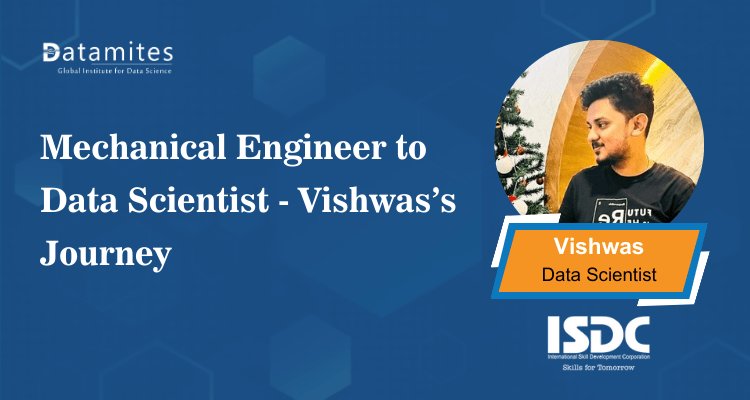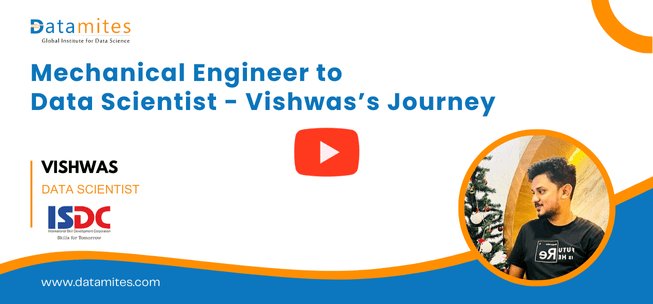Mechanical Engineer to Data Scientist: The Journey of Vishwas
This blog explores Vishwas's transition from mechanical engineering to data science, highlighting the skills he leveraged and challenges he overcame. It serves as an inspiring guide for engineers aspiring to enter the data science field.

Data science is one of the most sought-after career paths today, offering opportunities across a wide range of industries, including finance, healthcare, technology, and retail. As the world continues to generate massive amounts of data, the demand for skilled professionals in data science has skyrocketed. One such professional who has successfully navigated this career path is Vishwas, an alumni of DataMites. In an exclusive alumni talk, Vishwas shared his journey from being a novice to becoming a highly skilled data scientist. His story is both inspiring and insightful for anyone considering entering the field of data science.
We dive deep into Vishwas’s career journey, exploring the key decisions, challenges, and learnings that led to his success. We’ve compiled a series of questions and answers from the alumni talk to provide an in-depth look at his path to becoming a successful data scientist.
Vishwas’s Data Science Journey: Charting Success with DataMites
From a mechanical engineering graduate to a successful data scientist, Vishwas’s journey with DataMites showcases determination, upskilling, and strategic career transformation.
Q1: Can you tell us about your educational background and how you got into data science?
I graduated in 2021 with a degree in mechanical engineering. Afterward, I joined a Post Graduation Program (PGP) in Data Science at DataMites Institute. It was a 1.5-year course. After completing it, I was placed as a data scientist at ISDC (International Skill Development Corporation), a company based in the UK. Currently, I am working as a research analyst as part of the data scientist role.
Q2: What motivated you to transition from mechanical engineering to data science?
I was always interested in Artificial Intelligence (AI), and I wanted to acquire skills related to AI. I initially considered learning Java, but then I discovered that DevOps and data science were rapidly growing fields with high demand. The job prospects and good salary packages in these areas motivated me to pursue data science.
Q3: How was your experience learning Python as someone without a programming background?
In the beginning, I found it challenging. Learning Python, machine learning, SQL, and deep learning simultaneously felt overwhelming. Sometimes, I couldn’t balance my time between all the subjects. However, with consistent practice and dedicating around two hours daily, things started falling into place. It took me almost a year to feel confident in all the skills, and I had to manage learning while working in the mechanical field and attending night classes.
Q4: What challenges did you face during your job search and interview process?
During the interview process, the biggest challenge was the Python coding round. Initially, I was nervous about coding, but after consistent practice, I became more confident. The interviews typically started with a coding round, followed by assessments on machine learning basics, deep learning concepts, and communication/presentation skills. I gave four interviews before I finally got placed.
Q5: Can you describe the interview process in detail?
The interview had multiple rounds. First, I faced a Python coding round with several programming tasks. Then, there was a demo session to assess my communication and presentation skills. Afterward, they tested my understanding of machine learning, asking about concepts like decision trees, random forests, and deep learning techniques such as CNN, forward propagation, and backward propagation.
Q6: How did DataMites help you during your journey?
DataMites provided a well-structured syllabus that covered everything needed for the market. While the deep learning part was covered at a basic level, other subjects like Python, SQL, machine learning, and Tableau were covered in-depth. The certification from DataMites was helpful, and the placement team played an important role in providing opportunities for interviews. I was encouraged to apply on job portals like LinkedIn and Indeed, and the DataMites team assisted with the placement process.
Q7: How important is the certification provided by DataMites?
The certification is an essential part of the journey. Even though technical skills matter most, the certification validates your learning and gives you credibility. Companies look for certified professionals, and it plays a crucial role in getting noticed by recruiters. It is recognized globally, which gives you an edge over others who don’t have it.
Q8: What advice would you give to someone aspiring to pursue a career in data science?
For those looking to switch into data science, I would highly recommend DataMites as a platform. The course fees are affordable, and the instructors are technically sound. They have been teaching for many years, and the support is excellent. Additionally, I suggest focusing on your Capstone projects and client projects because they will give you a deeper understanding of real-world applications. Keep practicing regularly and stay consistent with learning and applying concepts.
Q9: What is your role now at ISDC, and how is it related to data science?
I am currently working as a research analyst at ISDC, which is part of a UK-based educational skill development corporation. My role involves analyzing student data from universities in the US and UK using machine learning algorithms and CNN models. It's a research-heavy role, focusing on understanding student performance and providing insights.
Q10: How did you find job opportunities during your job search?
The job portals like LinkedIn and Indeed were critical in getting interview calls. DataMites also helped by providing placement opportunities, but I would recommend not solely relying on them. It's important to apply to multiple platforms and keep your profile active. Stay in touch with the DataMites placement team for guidance and opportunities.
Q11: How long did it take for you to get placed after completing the course?
I received my job offer from ISDC about a week ago. It took me some time, but with consistent effort in learning and applying for jobs, I was able to secure the position.
Q12: What are the most important skills required for a career in data science?
The most important skills in data science include Python programming, SQL, and machine learning concepts. These are essential for almost any data science role. If you're good at these, you'll have a strong foundation for tackling various tasks in data science.
Q13: How did you prepare for your interviews?
I focused a lot on practicing Python and machine learning concepts. For Python, I made sure to complete exercises on platforms like GeeksforGeeks, focusing on data structures and algorithms. I also dedicated time to learning SQL and machine learning algorithms, and I made sure to practice coding on my laptop to overcome my nervousness.
Q14: How do you manage your work-life balance while learning and working at the same time?
It was tough initially, as I had to balance my work in mechanical engineering with my night classes at DataMites. I made sure to stay consistent and prioritize my tasks. Weekends were dedicated to reviewing the materials and practicing concepts. It was challenging but worth the effort.
Q15: How do you see the future of data science and AI?
Data science and AI are rapidly growing fields, and the demand for skilled professionals is only going to increase. With technologies like AI becoming an integral part of various industries, there will be plenty of opportunities in the coming years. It's a great field to be in for anyone looking to work on cutting-edge technologies and solve real-world problems.
Vishwas’s journey from a mechanical engineer to a successful data scientist is a testament to the power of persistence, continuous learning, and leveraging the right resources. DataMites played a crucial role in equipping him with the necessary skills to succeed in this competitive field. For aspiring data scientists, Vishwas’s story offers valuable insights and practical advice for navigating the complex world of data science. Whether you are just starting your career or looking to advance in the field, his journey serves as a reminder that with determination and the right tools, success is achievable.
Refer these articles:
- Non-Tech to Data Science: Dinesh’s Inspiring Path
- Becoming a Data Scientist: Atif Ansari’s Inspiring Career Leap
- From Civil Engineering to Data Science: Prasad’s Inspiring Journey
What Vishwas's Success in Data Science Can Teach Us
Vishwas's success in data science teaches us the importance of perseverance, continuous learning, and practical experience in overcoming challenges and achieving career growth.
- Vishwas UK is a mechanical engineering graduate from 2021 who transitioned into data science.
- He chose data science over Java due to better salary prospects and career opportunities.
- Initially had no background in coding, SQL, or data tools—faced significant learning challenges.
- Enrolled in a data science PGP course from DataMites to bridge the knowledge gap.
- Managed full-time work alongside night classes to build data science skills.
- Focused early on Python and SQL, using platforms like GeeksforGeeks for practice.
- Created handwritten notes and worked on mini-projects to reinforce learning.
- Learned data structures, algorithms, and machine learning systematically.
- Built several projects to strengthen his resume, including a credit card fraud detection system.
- Transitioned into a data scientist role at a startup and continues learning on the job.
- Recommends consistency, daily learning, and strong foundational knowledge for aspiring data scientists.
Refer these articles:
If you're thinking about making a career change into data science, now is the ideal time to level up your skills. According to a report by MarketsandMarkets, the global Data Science Platform Market was valued at $95.3 billion in 2021, with projections estimating it will reach $322.9 billion by 2026. This growth represents a compound annual growth rate (CAGR) of 27.7% during the forecast period from 2021 to 2026. This rapid growth is fueled by the increasing volume of digital data across various industries. To stay ahead in this ever-evolving field, it’s crucial to choose a training institute that emphasizes hands-on experience, real-time internships, and robust placement assistance. Enrolling in a reputable data science course in Mumbai, Pune, Bangalore, Hyderabad, Chennai, and Delhi can be your first step towards establishing a successful career in technology.
DataMites has emerged as a top provider of training in Data Science, AI, Machine Learning, Python Development, and Data Analytics. With accreditation from IABAC and NASSCOM FutureSkills, DataMites offers expert-led instruction, real-time project work, and comprehensive placement support, all of which ensure a smooth transition into the field of data science.
With data science offline training in Mumbai, Bangalore, Hyderabad, Chennai, Pune, Ahmedabad, and Coimbatore, alongside flexible online learning options, DataMites caters to learners from diverse backgrounds. Its practical, industry-driven curriculum equips freshers, working professionals, and career switchers with the essential skills needed to excel in data-driven roles.
Vishwas’s journey from a mechanical engineer to a data scientist is a remarkable example of career transformation. His experience shows that with the right mentorship, hands-on project work, and a strong drive to succeed, anyone—regardless of their previous academic or professional background—can successfully transition into the tech industry and build a fulfilling career in data science.

